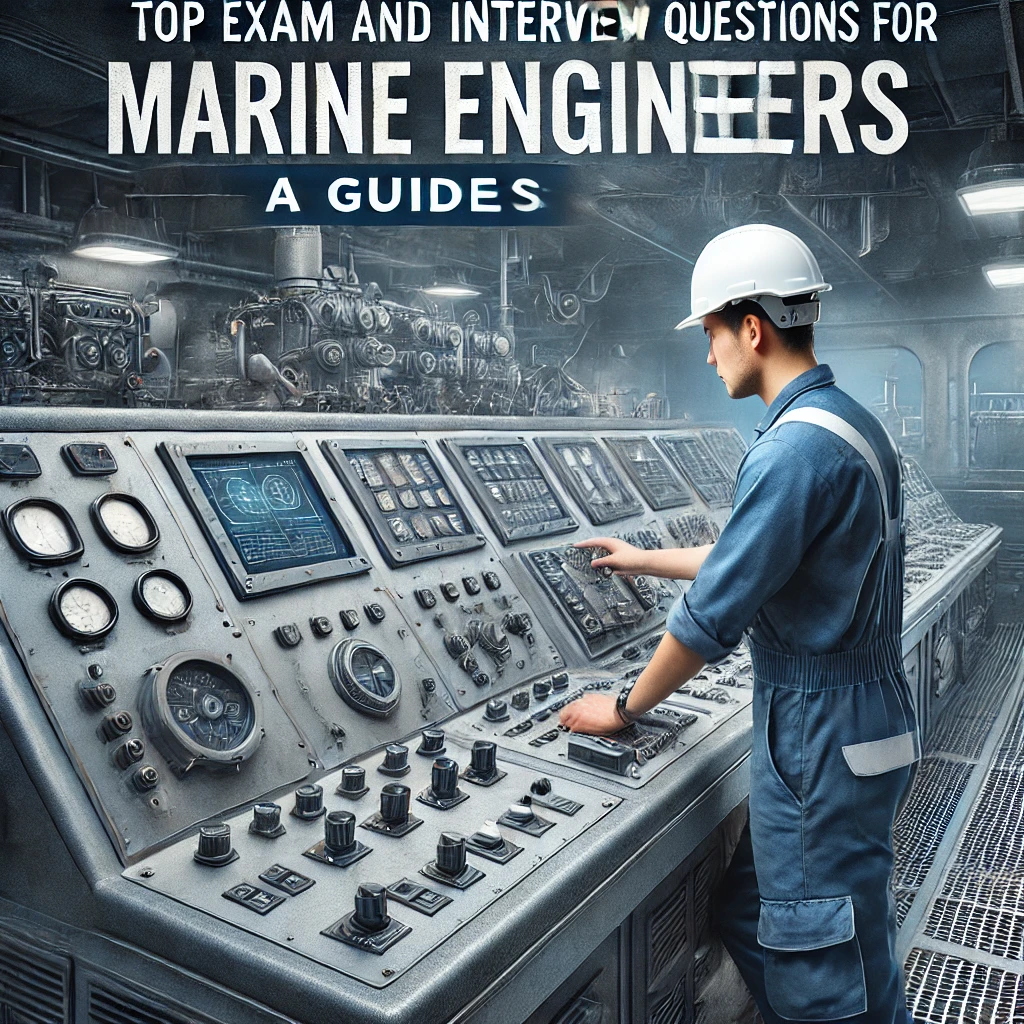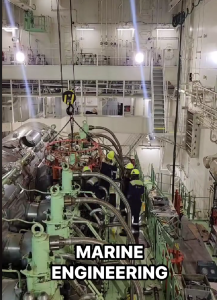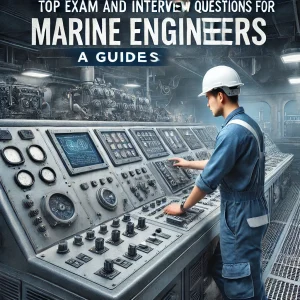Marine engineering is a dynamic field that requires technical expertise, problem-solving skills, and a strong understanding of ship machinery. If you’re preparing for marine engineering oral exams or interviews, knowing the most frequently asked questions can help you succeed.
This article will address key exam and interview questions based on frequently searched topics, offering tips to answers and explanations to help you prepare effectively.
1. What Are the Most Common Marine Engineering Interview Questions?
Interviewers often assess candidates on technical knowledge, problem-solving ability, and practical experience. Below are frequently asked questions with suggested answers:
General Questions
- Why did you choose marine engineering as a career?
Answer: Marine engineering combines my passion for mechanical systems and my interest in the maritime industry. The opportunity to work with complex machinery in a challenging and dynamic environment motivates me. - What are your strengths and weaknesses as a marine engineer?
Answer: My strengths include strong analytical skills, problem-solving ability, and adaptability in challenging environments. A weakness I am working on is time management under high-pressure situations. - Can you describe your experience with shipboard maintenance?
Answer: I have hands-on experience with routine maintenance of marine engines, pumps, and electrical systems. I am skilled in preventive maintenance, troubleshooting, and ensuring the efficiency of shipboard machinery.
Technical Questions
- Explain the working principle of a two-stroke and four-stroke marine diesel engine.
Answer: A two-stroke engine completes a power cycle in two piston strokes, while a four-stroke engine requires four piston strokes to complete a cycle. Two-stroke engines are more powerful and commonly used in large ships, whereas four-stroke engines are used in auxiliary applications. - What is the function of a turbocharger in a marine engine?
Answer: A turbocharger increases engine efficiency by forcing extra compressed air into the combustion chamber, leading to better fuel combustion and enhanced power output. - How does a purifier work in an engine room?
Answer: A purifier removes water and impurities from fuel oil using centrifugal force. The clean fuel improves engine performance and reduces wear and tear. - What are the different types of marine pumps and their applications?
Answer: Common marine pumps include centrifugal pumps (used for seawater cooling), reciprocating pumps (used for high-pressure applications), and screw pumps (used for fuel oil transfer). - Explain the concept of scavenge fires and how to prevent them.
Answer: Scavenge fires occur due to the accumulation of unburnt fuel and carbon deposits in the scavenge space. Preventive measures include regular inspections, proper combustion tuning, and maintaining the correct air-fuel ratio.
Emergency Procedures
- What would you do in case of an engine room fire?
Answer: Immediately activate the fire alarm, use CO₂ flooding if applicable, shut off fuel supply, and follow emergency protocols to contain and extinguish the fire. - How do you handle a fuel oil leak?
Answer: Isolate the source of the leak, shut off fuel valves, use absorbent materials to contain the spill, and report the incident as per safety protocols. - What actions should be taken if there is a blackout on a ship?
Answer: Identify the cause, restart the emergency generator if needed, reset breakers, check fuel and cooling systems, and bring the main engine back online following proper procedures.
What Is the MEO Class 3 Exam?
The Marine Engineer Officer (MEO) Class 3 exam is an essential certification for engineers aspiring to work onboard ships. It tests knowledge in:
- Marine diesel engines
- Auxiliary machinery (pumps, compressors, boilers)
- Marine electrical systems
- Ship stability and safety
- International maritime regulations (SOLAS, MARPOL)
Candidates must demonstrate proficiency in engineering principles, troubleshooting, and emergency handling to pass this exam.
What Are the Common Questions on Marine Auxiliary Engines?
Marine auxiliary engines power essential shipboard systems. Common questions include:
- What is the difference between a main engine and an auxiliary engine?
Answer: The main engine propels the vessel, whereas auxiliary engines provide power for electrical systems and support equipment. - How do you maintain a generator onboard?
Answer: Routine checks include oil changes, cooling system inspection, and load testing to ensure optimal performance. - Explain the lubrication system of a marine auxiliary engine.
Answer: Lubrication reduces friction, cools engine components, and removes contaminants from moving parts. - What are common faults in an auxiliary engine and how do you troubleshoot them?
Answer: Issues include overheating, fuel injection failure, and low lubrication pressure. Troubleshooting involves checking fuel filters, cooling systems, and lubrication flow.
What Are the Different Types of Fuel Pumps in Ships?
Fuel pumps play a crucial role in delivering fuel efficiently to the engine. The main types include:
- Fuel Transfer Pump – Moves fuel from storage to settling tanks.
- Fuel Booster Pump – Increases fuel pressure before it enters the engine.
- Fuel Injection Pump – Delivers fuel at high pressure for combustion.
- Purifier Feed Pump – Sends fuel to the purifier for cleaning before use.
Proper maintenance of these pumps prevents fuel contamination and engine failure.
What Are the Most Important Topics in Marine Engineering Exams?
Marine engineering exams cover core technical and operational subjects such as:
- Thermodynamics and heat transfer – Essential for understanding engine performance.
- Marine propulsion systems – Diesel engines, gas turbines, and hybrid propulsion.
- Shipboard safety and emergency procedures – Firefighting, lifeboats, pollution control.
- Electrical and automation systems – Generators, circuit breakers, control panels.
- Marine laws and regulations – IMO conventions, MARPOL, SOLAS, ISM Code.
Focusing on these topics ensures comprehensive exam preparation.
6. How Can I Prepare for a 4th Engineer Interview?
A 4th Engineer is responsible for assisting in machinery maintenance and fuel management. Interview questions include:
- What are your responsibilities as a 4th Engineer?
Answer: Maintenance of auxiliary systems, fuel bunkering, and monitoring engine performance. - How do you perform a bunker calculation?
Answer: By measuring fuel density, temperature, and tank capacity to determine fuel quantity. - What checks are carried out on boilers and economizers?
Answer: Inspections for leaks, pressure testing, and ensuring proper combustion. - Explain the function of an air compressor in a ship.
Answer: It provides compressed air for starting engines, control systems, and safety operations.
Preparing for marine engineering exams and interviews requires a thorough understanding of ship machinery, safety procedures, and international regulations. By reviewing the common questions covered in this article, aspiring engineers can boost their confidence and increase their chances of success. For detailed study materials and marine engineering resources, explore our maritime education platform and enhance your professional knowledge.
For additional related information, we recommend reading the following article:
Top 40 Questions Asked for the Oral Exam of Marine Third Engineer Officers



